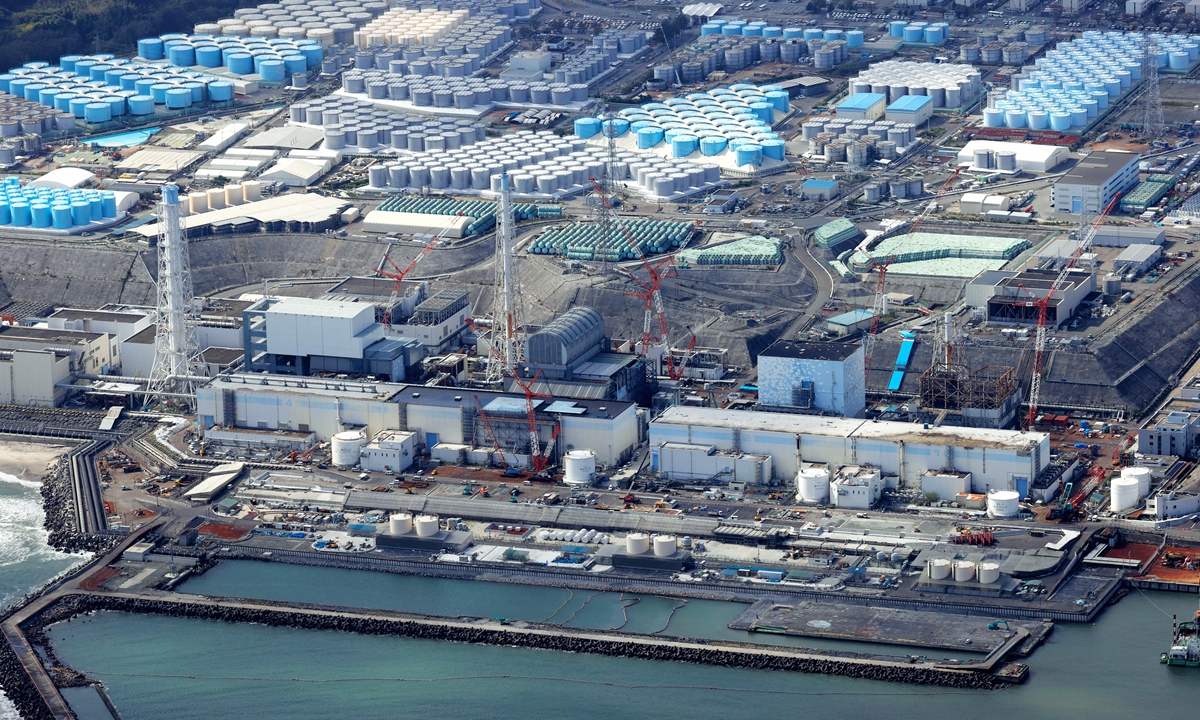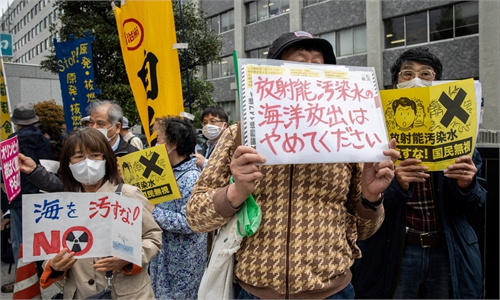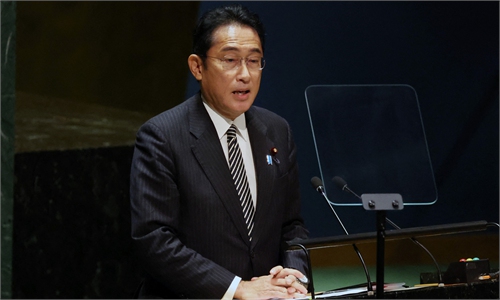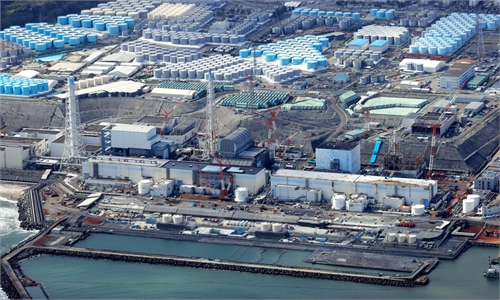China urges Japan to stop irresponsible plan of dumping nuclear-contaminated water amid wide criticism

A file photo shows containers of nuclear-contaminated water at the Fukushima nuclear plant in Japan on October 16, 2020. Japan's nuclear regulator on July 22, 2022 approved the dumping of the water into the sea, despite international concerns and protests. Photo: VCG
China's Foreign Ministry urged Japan to stop its irresponsible plan to force the dump of nuclear-contaminated water into the sea, after the Japanese government announced last week that the discharge of Fukushima water would start around this spring or summer, sparking widespread criticism both at home and abroad.
The Japanese government gave an estimate for when the water from the crippled Fukushima No. 1 nuclear power plant will be released into the sea, saying at a cabinet meeting held on January 13 that it could happen sometime "around this spring or summer." In April 2021, the government approved the release of more than 1 million tonnes of irradiated water from the site after treatment into the ocean.
The move was met with criticism from home and abroad. Organizations in Japan and people from many countries have spoken out against Tokyo for breaking its promise and expressing strong opposition to the decision.
Wang Wenbin, spokesperson for the Chinese Foreign Ministry, said at a regular press briefing on Thursday that the marine environment concerns the interests of the international community as a whole, and the discharge of the nuclear-contaminated water is not a matter for Japan to decide alone. The Japanese government has pushed ahead with the plan despite widespread concerns and strong doubts expressed at home and abroad, Wang said, pointing out that such a self-serving move will certainly trigger dissatisfaction and criticism from all walks of life.
Expressing his concern over the upcoming dump of the nuclear-contaminated water, the spokesperson cited a number of comments from experts and environmentalists in the international community.
The head of the Asian Century Philippines Strategic Studies pointed out that the Japanese government's unilateral push to dump the water runs counter to international environmental laws and regulations.
The head of the Korea Federation for Environmental Movements, a South Korean nongovernmental environmental organization, said that the release of nuclear-contaminated water into the sea will set a very negative precedent if it goes ahead.
The lead researcher of the Shirshov Institute of Oceanology of Russian Academy of Sciences noted that the nuclear-contaminated water slated for release into the sea contains a large amount of radioactive material that cannot be thoroughly filtered through existing technology, and poses serious harm. It is particularly regrettable that the Japanese government and the Tokyo Electric Power Company (TEPCO) have gone back on promises that they would not dispose of the water without the understanding of relevant parties.
Secretary General Henry Puna of Pacific Islands Forum (PIF) said that the Japanese government had pledged to maintain communication with Pacific Island countries on the disposal of the nuclear-contaminated water and to provide all independent and verifiable scientific evidence on the issue. However, the Japanese government went against its promise to not go ahead with the discharge without Pacific leaders' approval.
"Our region is steadfast that there be no discharge until all parties verify it is safe," Puna said on Wednesday at a livestreamed public meeting in Suva, Fiji.
According to media reports last week, Puna has indicated that Japan could lose its status as a Pacific Islands Forum Dialogue Partner over the lack of information on the dumping plan.
Wang said, "We urge Japan to respect the legitimate concerns and strong voice of the domestic people and the international community, honor its commitment, earnestly dispose of nuclear-contaminated water in a scientific, open, transparent and safe manner, and stop the irresponsible act of forcing the release of nuclear-contaminated water into the sea."
Japan's dumping of Fukushima nuclear-contaminated water into the ocean will have influence on the ocean environment, security of food and people's health, and Japan made such unilateral decision without having full negotiation with neighboring countries or international organizations, which is irresponsible and immoral, Li Song, Chinese ambassador for disarmament affairs, said in August, 2022 at the Tenth Review Conference of the Parties to the Treaty on the Non-Proliferation of Nuclear Weapons, expressing strong concerns over the related issues.
Japan's unilateral decision to dump Fukushima nuclear-contaminated water into the ocean is made purely out of concerns for its own economic cost, and it has neither resorted to all possible ways to handle it, nor had full negotiations with neighboring countries. Such selfish move is to transfer the risk to the international community. People in Japan, China, South Korea, Russia and Pacific island countries all expressed their concerns, Li said.
Global Times



